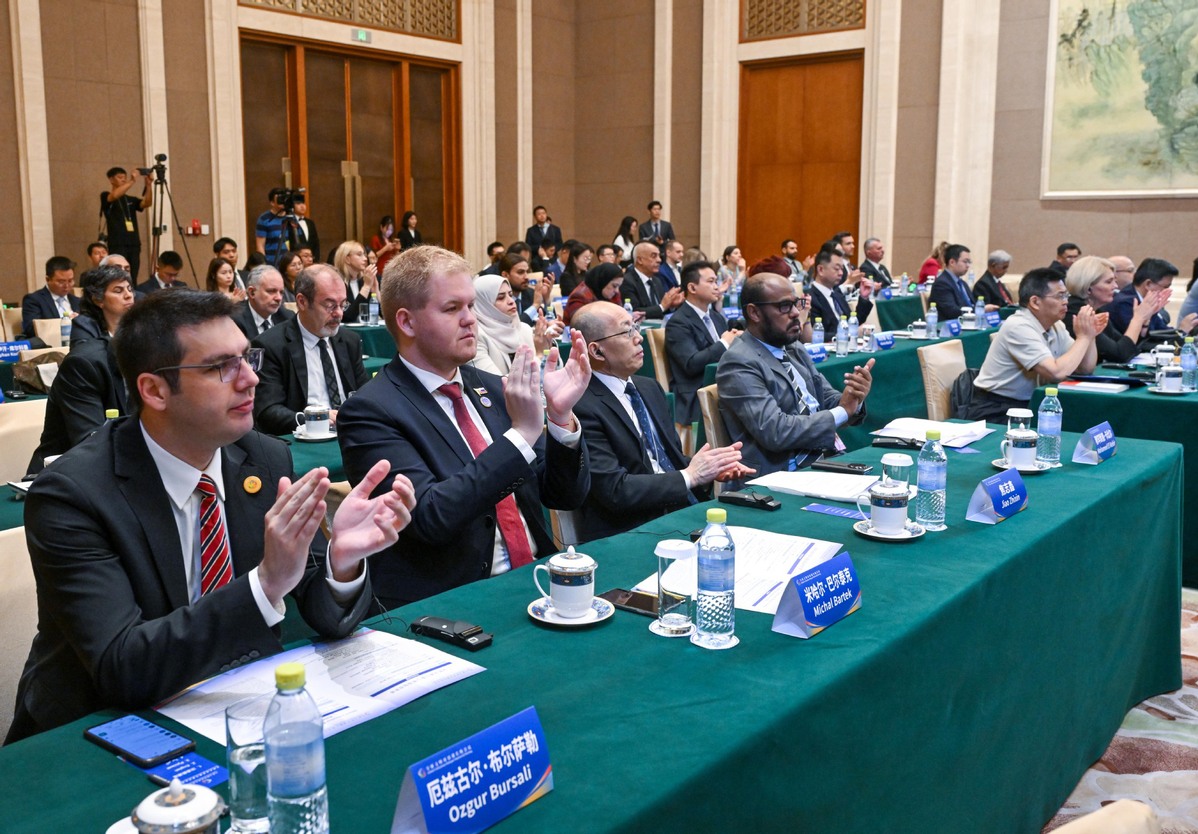
President Xi Jinping's congratulatory letter to the Global Civilizations Dialogue Ministerial Meeting has received widespread positive responses from international experts, who commended China's commitment to dialogue, mutual respect and cross-cultural cooperation as a constructive approach to addressing global fragmentation.
Xi, who is also general secretary of the Communist Party of China Central Committee, said in the letter that China will work with other countries to champion equality, mutual learning, dialogue and inclusiveness among civilizations, and will implement the Global Civilization Initiative, in a bid to provide fresh impetus for advancing human civilizations and promoting world peace and development.
READ MORE: Build network for cooperation, dialogue, Xi says
Christopher Bovis, a professor of international business law at the University of Hull in the United Kingdom, said the letter's message is "timely and impactful", particularly amid current geopolitical tensions.
He pointed out that as the world is facing conflicts from the Middle East to Ukraine and economic turbulence is stemming from protectionist trade measures, President Xi's emphasis on diplomacy over confrontation is both principled and pragmatic.
"China prioritizes resolution of conflict via peaceful and diplomatic ways, avoiding conflict and warfare which bring on lasting disruption in life and economic relations," he said.
Lawrence Loh, director of the Center for Governance and Sustainability at the National University of Singapore, also highlighted the unity of humanity cited in the letter.
"President Xi has identified a critical priority for fostering global unity at a time when the world is increasingly fractured and fragile. Now more than ever, nations must look beyond narrow self-interest and work toward cultivating harmonious international relations," Loh said.
"The most urgent challenge today is to build a robust global economy grounded in free trade and multilateralism, which will enhance the well-being of people worldwide, especially in developing countries," he added.
Tahir Farooq, editor-in-chief at Daily Ittehad Media Group and Pakistan Economic Net, said that Xi's initiative offers much-needed wisdom and stability in an era of divisions, ideological confrontations and geopolitical rivalries.
"By emphasizing equality, mutual learning and inclusiveness, President Xi charts a constructive path forward, rejecting the politics of division and embracing the shared heritage of human civilizations," he said.
Dennis Munene, executive director of the China-Africa Center at the Africa Policy Institute in Nairobi, Kenya, described the letter as "a clarion call to humanity".
Munene said that Xi "positions dialogue among civilizations as an antidote to the destructive theories like the 'clash of civilizations' or the Thucydides trap", which refers to a phenomenon whereby a rising power can cause fear in an established power that escalates toward war.
"China's approach, emphasizing equality, dialogue and inclusiveness, encourages the world to recognize different development paths and forms of democracy. It's about building trust and solving shared challenges such as poverty, disease and climate change through inclusive dialogue," he said.
Russel Harland, deputy branch secretary and international relations officer of the Surrey County branch of UNISON, one of the UK's largest trade unions, said the Global Civilization Initiative, which was proposed by Xi in 2023, offers a way to solve the problems the world is facing today.
"With the West now in moral free fall, (the GCI) offers a radiating light out of the dark path that the world has plummeted into. China's peaceful development has shown another way is possible," he said.
Shakeel Ahmad Ramay, CEO of the Asian Institute of Eco-civilization Research and Development in Pakistan, also praised the philosophical underpinnings of the message in the letter.
He said that Xi also outlined the tools and pathways for achieving these goals, emphasizing the importance of fostering mutual understanding, respecting cultural diversity, recognizing the contributions of different civilizations, and creating conditions for peaceful coexistence.
Farooq, the editor-in-chief from Pakistan, said: "History teaches us that civilizations flourish not in isolation, but through dialogue and cooperation. By championing cultural exchange and peaceful coexistence, China is promoting a multipolar world where all cultures are respected and diversity is viewed as a strength."
Experts also praised the meeting as a valuable platform for bridging civilizations and fostering greater cooperation among peoples.
Farooq said that by hosting the Global Civilizations Dialogue Ministerial Meeting and actively encouraging discourse on protecting cultural diversity, China has reinforced its role as a global advocate for peace and cooperation.
In today's fast-paced world, deepening dialogue and cultural exchanges is crucial for combating stereotypes and strengthening bonds, said Mohammad Ghazal, managing editor of English news at the Aletihad News Centre in the United Arab Emirates.
ALSO READ: More dialogue encouraged for peace, stability across Eurasia
These practices provide a valuable model for strengthening global partnerships in support of peace, development and a better future for humanity, he added.
The high-profile meeting, held on Thursday and Friday in Beijing, was co-hosted by the Publicity Department of the Communist Party of China Central Committee and the International Department of the CPC Central Committee.
Themed "Safeguarding Diversity of Human Civilizations for World Peace and Development", the meeting brought together more than 600 representatives from 140 countries and regions, including political party leaders, government ministers, cultural and artistic figures, and scholars from leading think tanks.
Wang Mingjie and Xing Yi in London and Cui Haipei in Dubai contributed to this story.


